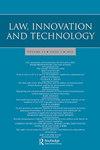Platform power, technology, and law: consumer powerlessness in informational capitalism
Q1 Social Sciences
引用次数: 3
Abstract
ABSTRACT The shift in the political economy from market-based to informational capitalism is wrought by increased use of technology and the adoption of platforms as the dominant networks of transaction. This has led to a concomitant increase in power of the platform entities to exert control over substantial parts of world populations. The platform entities have accrued and exercise this power including through their use of user data, by controlling the discourse and the imaginary surrounding the platforms, and through the affordances of the platforms themselves. Another of the technologies used by the platform entities to gain and entrench power is the law itself. Informational capitalism evolved within a system of existing laws. The way that platform entities have in turn enforced, ignored, and manipulated laws requires us to re-examine the law’s relationship with power. This paper examines theories of power and focuses on Steven Lukes’ radical view of power in three dimensions to help understand that relationship between power, technology, and consumer laws. The paper sets out some of the ways that consumers are manipulated, including through the use of law, in what Lukes describes as the third dimension of power.平台权力、技术与法律:信息资本主义中的消费者无力
摘要政治经济从市场资本主义向信息资本主义的转变是由于技术的使用增加和平台作为主导交易网络的采用。这导致平台实体对世界上相当一部分人口施加控制的权力随之增加。平台实体已经积累并行使了这种权力,包括通过使用用户数据,通过控制围绕平台的话语和想象,以及通过平台本身的可供性。平台实体用来获得和巩固权力的另一项技术是法律本身。信息资本主义是在现有法律体系中发展起来的。平台实体反过来执行、忽视和操纵法律的方式要求我们重新审视法律与权力的关系。本文考察了权力理论,并从三个维度关注了史蒂文·卢卡斯的激进权力观,以帮助理解权力、技术和消费者法律之间的关系。本文阐述了消费者被操纵的一些方式,包括通过使用法律,Lukes将其描述为权力的第三维度。
本文章由计算机程序翻译,如有差异,请以英文原文为准。
求助全文
约1分钟内获得全文
求助全文
来源期刊

Law, Innovation and Technology
Social Sciences-Law
CiteScore
4.50
自引率
0.00%
发文量
18
期刊介绍:
Stem cell research, cloning, GMOs ... How do regulations affect such emerging technologies? What impact do new technologies have on law? And can we rely on technology itself as a regulatory tool? The meeting of law and technology is rapidly becoming an increasingly significant (and controversial) topic. Law, Innovation and Technology is, however, the only journal to engage fully with it, setting an innovative and distinctive agenda for lawyers, ethicists and policy makers. Spanning ICTs, biotechnologies, nanotechnologies, neurotechnologies, robotics and AI, it offers a unique forum for the highest level of reflection on this essential area.
 求助内容:
求助内容: 应助结果提醒方式:
应助结果提醒方式:


